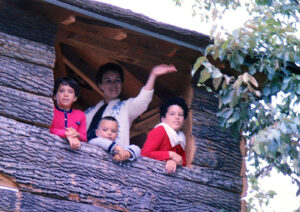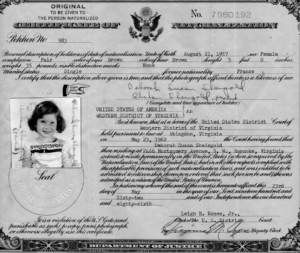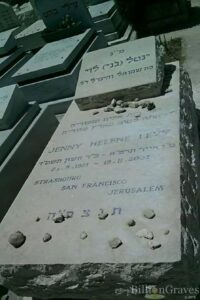A Double NPE
By Angie Clark
I had a rocky, on- and off-again relationship with the man I knew as my dad my entire life. But in 2007, we were tight. We’d practically been best friends for about 10 years at that point. Unfortunately, he met a woman he would marry later that year and who, for various reasons, wasn’t a fan of mine or any of his other family members, and not long after, he completely cutties with me.
Ten years later, I heard his wife had been saying tacky things about me to my nephew and even had the audacity to say something to the effect of “Angie isn’t even his real daughter!” The next thing I knew, I was agreeing to a DNA test because, clearly, she is out of her mind … right? There was someone related to the family who was acting as a go-between, and she said we should take the tests. My “dad” took one the following week. I was happy to put to rest once and for all the rumor his wife had started. On Thanksgiving morning, 2017, at about 7am, I was awakened by the ding on my phone letting me know I had an email message. When I checked it, I saw: “SUBJECT: Your DNA Test results are in!” I was 43 years old, and my mind was flooded with memories and images of my life as I tried to comprehend that my dad, my hero, the man I’d wanted my entire life to make proud of me was, indeed, not my biological father.
Four years earlier, my mom had passed away. In those last days of her life, we had many deep conversations, and one of them was about my dad. She knew how hurt I’d been the last few years about his distance and that I never understood how he could just abandon me that way. How could anyone do that to their daughter? It crossed my mind maybe he wasn’t my dad, so asked my mom if there were any possible way that anyone else could be my father. She clearly and firmly said no, and I left it at that. It was just a random thought anyway.
After my DNA test results came in, without being able to go to my mom for answers, I immediately began making phone calls and sending email messages. I’d always heard rumors about my mom having had affairs, and my phone calls confirmed that. There was one man she was especially close with, a family friend, and there had been rumors about them being together. I knew him my entire life, so I called him. After we caught up on a few things and I explained what was going on, he told me that it would be him. He had been with my mom multiple times, and I even found a photo of them dancing together on New Year’s 1974, which is about the time I would have been conceived. I didn’t have a definitive DNA match, but I had an acquaintance helping me sort through all of the DNA findings because she had done a lot of DNA research. She told me he probably was my biological father because she found several of his ancestors in my matches. With my friend’s confirmation and his admission, we both accepted that he was my biological father. He told me that he didn’t want anyone to know because he was still married to the same woman he was married to back then, and he didn’t want to hurt her or their children.
Although it was painful and I felt rejected, I respected that he didn’t make this known to any of his friends and family. I tried to move on, but it was hard. I was dealing with so many feelings and different facets of rejection. I felt alone and unworthy of being wanted or loved. In addition, I was battling feelings about my mother. I would have expected to be very angry with her, but I wasn’t. I guess I was hurt more than anything. Hurt that she didn’t feel like she could be honest with me and that she carried that secret her entire life. I also found myself replaying so many times in my life, trying to dissect choices she made and things she said, trying to see if I could find any hints or clues that I might have missed. I also thought about the fact that the man who raised me was my “dad” for 43 years. Not long after my parents divorced and I was living with my mom, I came home from school one day and she had our apartment packed up. I was so excited thinking that we must be moving back into a house instead of the apartment, so I asked her where we were moving. “I am moving to California, and you are staying with your dad here in Texas,” she said. “He will be here in 20 minutes.” Before I could even process what was happening, I was in a car being driven by my stepmother, taking me to what would be my new home.
Now, as an adult with my newly discovered information, I couldn’t help but wonder how she could have done that? It’s one thing to abandon a child for five years, but she knew in her heart that he wasn’t even my dad. To think of everything I went through during those years, and again … he wasn’t even my dad. These types of thoughts and scenarios played out in my mind for the next two years.
Although I was coming to terms with this mind-blowing discovery, in the summer of 2020 something was telling me this story wasn’t over. I felt like I was missing something. As much as I didn’t want to open old wounds, I started to poke around again. On social media, I was introduced to a group called DNAngels. I sent them a message and explained my situation. I said that I’d discovered who I thought was biological father, but I felt as if something was missing. I wanted concrete evidence. DNAngels accepted my case, and within 10 minutes of just browsing my family tree and DNA matches, Laura Olmsted, who was working my case, called me. “Well I can already tell you that I don’t think he is your biological father,” she said. Wow! Here we go again, I thought. Another emotional roller-coaster ride, coming right up!
Laura told me that she’d do her best to confirm her suspicion and to find my biological father. She asked me to allow her some time as she was still finishing up some other cases, and mine might be tricky without many matches on my paternal side. During the next few days, I couldn’t help but be excited. Was this a second chance? I already went through the rejection from the person I thought was my dad. Maybe this was going to be the happy ending I had always wanted! Maybe a dad, maybe more—maybe a family!
One week later, a little past midnight, Laura sent a message. She was sorry for messaging so late, but she hit a rabbit trail on my case and was so excited she wanted to share it with me right away. She said she’d discovered my great-grandparents on my paternal side. This was exciting and amazing that she found them so fast. Over the next hour she messaged back and forth with a few discoveries and to let me know she was getting closer. After about half an hour of silence, when I thought maybe she’d decided to call it a night and go to bed, she sent another message. “I would like you to meet your Father,” and she attached a picture of a very handsome man, a photo clearly taken a good 60 years earlier when he was a teenager. I could see the resemblance between us. It was amazing! She sent a few more photos and more information about him and his family. She even gave me contact information so I could reach out to him. I was so excited I didn’t even go to bed that night. I stayed up all night thinking about calling him first thing in the morning.
All night, I played out in my head what I would say and how he would respond, and I would go through scenarios of various outcomes. Although I knew better than to expect a happy ending, that hope inside of me had been reignited. I knew he would probably be shocked; after all, he was 83 years old. I didn’t know if he knew about me or if this would be a complete surprise. My goal was to let him know who I am, and at least give him my contact information so he could reach out to me after the shock wore off, if he was inclined to do so.
At 9 a.m., my hands were trembling and my heart was racing as I dialed his phone number. I almost couldn’t even speak; then I heard him say hello. My first thought was that he sounded so sweet—like such a nice man. I said hello, told him my name, and explained that I’d been researching online and found that he knew my mom—that they worked together back in the early 70s. “Yes!! Of course I remember Nancy,” he said. I told him what I’d been researching and that I’d discovered he was my biological father. I said I understand it might be a huge shock and that he might need some time to think about it.
“Well… what do you want?” he asked. “I don’t want anything other than to give you my contact information so that someday, if you decide you want to reach out to me, you can.” He then said he didn’t see the point of that, and as he continued to talk about how other people involved would be hurt, I couldn’t help but to slowly fade out to thoughts of rejection, disappointment, and absolute heartbreak. Again. I couldn’t even get him to take my phone number before he said, “Well good luck,” and hung up. And just like that, my second chance for a happy ending was over. I couldn’t believe it. How could this happen? Again.
A few hours later, I learned that someone associated with DNAngels actually knew him. What a coincidence! She’d worked with him at the same company, but later in the 1980s. She offered to talk to him again for me, to explain that I wasn’t a fraud, and to share with him how all of this came about. Before she hung up, she asked me what three questions I’d like to ask him. I replied:
- Did you know I existed and did you love my mother or was it just a casual relationship?
- Is there anything in my medical history I need to know? I’ve battled several chronic illnesses so this would be great information to have.
- Is there anything you want to know about me—anything that I could share about myself?
A few hours later, she called back and told me about her conversation with him. No, he did not love my mother, it was an on and off again sexual affair that started at work. He claimed he didn’t know about me or even that she’d been pregnant. He shared with her his medical history, and after she asked the last question about what might want to know about me, he said, “Well, I don’t know, I can’t think of anything.”
What a kick in the gut; not only did he not even want my phone number, he didn’t even want to know one single thing about me. Yet I had and still have so much I would love to share with him about me and his grandson.
People have asked if I regret pursuing this again only to be hurt. My answer is absolutely not. DNAngels brought me something priceless—the truth. And although this isn’t a happy ending, after a few days of wallowing in my feelings and drowning in my tears, I found such strength and resolution in knowing the truth and knowing where I came from once and for all. Most of all, I found closure.
Almost four years since that DNA test, I have been through many challenges, most of which are all directly related to fallout of this discovery. It’s amazing to me how such indescribable hurt and loss can morph into such a source of strength and resilience. Not long after the initial discovery, I had a complete emotional breakdown. I stopped working. I became very ill and I even lost my home. I remember sitting there in my car in the gas station parking lot looking through my phone trying to find someone, anyone, I could stay with. There was no one. I was officially homeless. Since then, I rebuilt from the bottom up. Physically, emotionally, and financially. I even went back to college and I’m about to complete my MBA. After much time of healing, I reached out to my two new sisters twice, with no response. I have since put myself in their shoes, and I do understand how one email completely changed what they believed and thought about their father and the family they were raised in, and I certainly understand wanting to protect their mother. I will never lose hope that one day they will want to know me and my story and share theirs with me. Until then, I’ve found family and comfort in others who have been through this lifechanging experience. I’ve decided I must share my story with others. I have to let them know they are not alone and that not all of us have ideal happy endings with our newfound families. But, this doesn’t mean we haven’t gained something extraordinary from this experience, and I am forever grateful for that.
Angie Clark is from Dallas, Texas and has spent time in Los Angeles, Boston, and Stockholm. She’s a proud mother to her son Erik and a devoted cat mom. She discovered her NPE status in November 2017, and her story has been featured in several podcasts and publications. Clark is a graduate of Southern New Hampshire University with a Bachelor of Science in Business Administration and is in the Master of Business Administration (MBA) program with an anticipated completion date of November 2023. She was a featured guest speaker at Harvard Medical School, and is working on her first book, to be released in December 2024. Follow her on Instagram @angiecarolyn74 and on Twitter @angiecclark.

 It’s been 6 years since I got the news over the phone late one night from my brother David. He told me to sit down because he had something shocking to tell me. I thought it was about our dad, Abe, who was in the hospital due to severe dementia and a fall two weeks earlier, but David said it was something else. He’d been cleaning Abe’s New York apartment and found a metal box with a lock on it. When he opened it, he found documents pertaining to my European adoption—an adoption I never knew had happened.
It’s been 6 years since I got the news over the phone late one night from my brother David. He told me to sit down because he had something shocking to tell me. I thought it was about our dad, Abe, who was in the hospital due to severe dementia and a fall two weeks earlier, but David said it was something else. He’d been cleaning Abe’s New York apartment and found a metal box with a lock on it. When he opened it, he found documents pertaining to my European adoption—an adoption I never knew had happened.